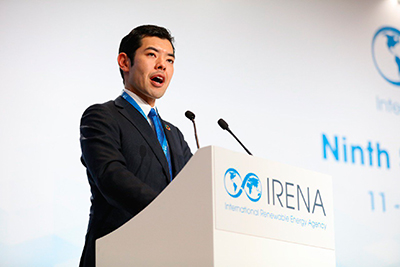(9) Securing Access to Resources and Energy
The number of people without access to electricity in the world is estimated at around 900 million (equivalent to 13% of the world’s population), and more than 600 million people of the population in Sub-Saharan Africa, equivalent to 57% of the population. In Sub-Saharan Africa, around 900 million people rely on fuelwood (e.g., charcoal, kindling) for cooking, which produces indoor air pollution that has become one cause of death among youths. The lack of electricity, gas and other energy services leads to many issues, such as the delay in industrial development, a loss of employment opportunities, and a further increase in poverty. Stable energy supply and appropriate consideration to the environment are essential since the global energy demand is expected to increase further, mainly in emerging and developing countries, particularly in Asia.
■Japan’s Efforts
In order to realize sustainable development and secure energy in developing countries, Japan works on the provision of services which enables modern energy supply, and the stable supply of electricity for industrial development. In addition, Japan provides support for the establishment of an environmentally friendly infrastructure (socio-economic infrastructure), such as the construction of energy-saving equipment and power generation facilities that utilize renewable energy (hydropower, solar photovoltaics, solar thermal, wind power, geothermal power, etc.).

Parliamentary Vice-Minister Tsuji Kiyoto giving a speech at the Ninth Session of the International Renewable Energy Agency (IRENA) Assembly held in the United Arab Emirates in January 2019
In view of the significant changes in the global energy situation, Foreign Minister Kono of the Ministry of Foreign Affairs (MOFA) presented the “Evolving Energy Diplomacy - Energy Transition and Future of Japan” policy speech in July 2018. In this speech, Foreign Minister Kono announced MOFA’s future vision of energy diplomacy, which responds to the world’s energy situation and continuing energy transitions in the context of the increasing momentum of international initiatives towards decarbonization initiated by the ratification of the Paris Agreement, and the major shifts seen in both the supply and demand side of the energy sector.
Moreover, at the Foreign Embassy Strategy Council on Energy and Mineral Resources held in February 2018, members of MOFA gathered together with members from overseas diplomatic missions, other relevant ministries, attendees from various organizations and the private sector, and experts to discuss the challenges and measures related to securing a stable supply of energy and resources in Japan. The meeting contributed to the further strengthening of Japan’s energy and resources diplomacy, addressing topics such as the priority issue of securing a stable supply of energy and resources to Japan, Japan’s commitment to contributing to the overall energy security of the world, the advancement of energy diplomacy to increase the marketplace competitiveness of Japan’s technological strengths, and the importance of strengthening multi-layered collaboration with international organizations, including contribution towards achieving the Sustainable Development Goals (SDGs).
Japan also proactively supports the Extractive Industries Transparency Initiative (EITI), which is a multinational cooperative framework to increase the transparency of the money flow in the development of oil, gas, mineral, and other resources. Under this framework, extracting corporations report the amount of payment to the governments of resource-producing countries, and the governments also report the amount of the revenue to the EITI in order to ensure transparency of the money flow. 51 resource-producing countries, many supporting countries including Japan, extracting companies and NGOs are participating in the EITI, and working together to prevent corruption and conflict, as well as to encourage responsible resource development that leads to growth and poverty reduction.
